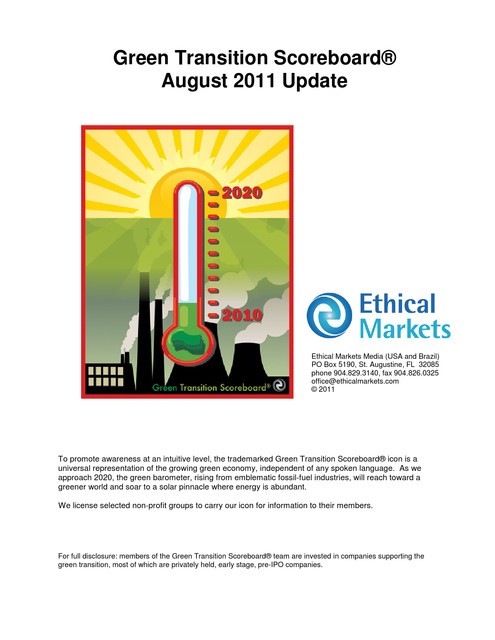Green Transition Scoreboard
Post on: 16 Май, 2015 No Comment

What is the Green Transition Scoreboard?
Green Transition Scoreboard® (GTS) is a time-based global tracking of private investment into all sectors comprising the growing green economy. The goal of the GTS is to produce a transparent line of sight to the progress of ethical wealth building as defined by the triple bottom line of planet, people and profits.
The GTS logo represents a visual symbol for inevitable human progress whose barometer rises, away from the symbols of the outdated Fossil Fuel Era. As green investments increase over the coming decades, we enter into what Jeremy Rifkin refers to as the Third Industrial Revolution.
The GTS logo was created by Hazel Henderson and Ethical Markets Media. It is updated and maintained by Ethical Markets Media, LLC. Financial data and organizations included in the GTS are screened by the most rigorous social, environment, and ethical auditing standards.
Why the Green Transition Scoreboard?
Educators, futurists and business leaders worldwide cite the Sustainability Megatrend as the defining design principle for the 21st Century. (1)(2) The Green Transition Scoreboard is a way to put attention on the amount and types of investments that are flowing into this Megatrend. In 2009 Ethical Markets postulated that $10 trillion invested by 2020 would be sufficient to tip the global economy into the Solar Age. At the current pace we will reach there ahead of schedule sometime in 2018!
The Green Transition Scoreboard tracks private investments in renewable energy, energy efficiency, green construction, water, green R&D and Cleantech. It does not include government funding or investment in food-based bio-fuels.
Financial data and organizations included in the GTS are screened by rigorous social, environment, and ethical auditing standards. The latest sustainability auditing standards, including SASB, ICAEW and others are used. Data is gathered from green and sustainability indexes, financial media, UN and other international studies, and the Climate Bonds Initiative.
In addition to these auditing standards, the GTS definition of green is strict. Clearly unsustainable sectors as well as certain technologies having unsubstantiated claims, negative EROI or unexplored or untested consequences are omitted. For example, the GTS omits coal carbon sequestration (CCS) due to its major government subsidies, huge costs, unproven technology and lower efficiency of energy production.
Resources:
1. Lubin, D. and Esty, D. (2010) The Sustainability Imperative, Harvard Business Review https://hbr.org/2010/05/the-sustainability-imperative
2. Rifkin, J. (2011) The Third Industrial Revolution, St. Martins Press; Palgrave Macmillan Trade.














